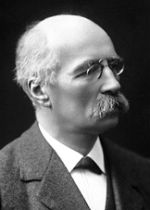Henri La Fontaine
Henri La Fontaine
The Nobel Peace Prize 1913
When Germany invaded Belgium, 1914, “Peoples will be as before, the sheep sent to the slaughterhouses or to the meadows as it pleases the shepherds.“
Biography
Books
Images
Honoring Fontaine
Videos
Founder
Biography
By Lillian Hatch
Henri La Fontaine was born in Brussels, Belgium on 22 April 1854. After studying law at the Free University of Brussels he was admitted to the bar in 1877. Having established his reputation as an authority on international law, he became a professor in this subject at the Free University in 1993. An early proponent of women’s suffrage, in 1890 he founded the Belgian League for the Rights of Women. In 1895 he became a member of the Belgian Senate from the Socialist Party.
La Fontaine became interested in the International Peace Bureau, founded in 1891-92 and headed by Fredrik Bajer and Élie Ducommun. He helped the Bureau to bring about The Hague Peace Conferences of 1899 and 1907. Becoming president of the Bureau in 1907, he stayed in this office until his death in 1943.
In 1919 he served as delegate to the League of Nations. He founded the Centre Intellectual Mondial (World Intellectual Center) which later became part of the League of Nations Institute for Intellectual Cooperation, proposing the idea of a world university, parliament, and international justice system.
He authored many legal handbooks and a documentary history of international arbitration. He founded the journal La Vie Internationale.
Henri La Fontaine had wide ranging interests: legal means of settling international disputes; bibliography; education; women’s rights; labor – mine inspection, eight-hour day and forty-hour week; mountaineering, climbing; essays, poetry, translation; opera.
During Henri La Fontaine’s lifetime, his native Belgium was invaded again in the Second World War. He did not live to see it being liberated for he passed away in Brussels, Belgium on 14 May 1943.
